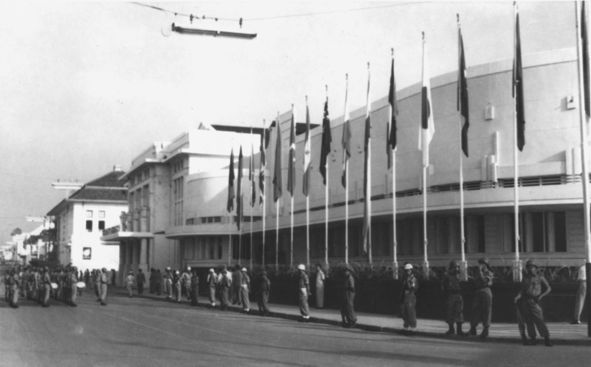|
Roostijati
Roostijati ( Perfected Spelling: Roostiati; December 27, 1925 – September 5 or September 11, 1975) was an Indonesian actress, soldier, radio announcer, director, athlete, teacher, and make-up artist. She was the sister of actor Djoni Sundawa and was the second Indonesian women director after Ratna Asmara by directing '' Genangan Air Mata'' (1955), and was one of the six Indonesian women director before 1998. She was the part of Classical Indonesian Cinema. Born and raised in Bandung, Roostijati went to Hollandsch-Inlandsche School, and completed her education at Mode Vaak School. In 1945, she joined Laskar Wanita Indonesia (LASWI) as a captain, and moved to sector III, where she worked as a radio announcer and stole the power tools for soldier in forest. Early life Roostijati was born on December 27, 1925, in Bandung, West Java. Her brother was actor Djoni Sundawa. She went to Hollandsch-Inlandsche School, and completed her education at Mode Vaak School. During her school ... [...More Info...] [...Related Items...] OR: [Wikipedia] [Google] [Baidu] |
Genangan Air Mata
''Genangan Air Mata'' (literally ''Puddle of Tears'') is a 1955 Indonesian drama film directed by The Teng Chun and Roostijati who also starred in this film with Djoni Sundawa. Cast Production ''Genangan Air Mata'' was produced by Fred Young (director), Fred Young for Bintang Surabaja. The black-and-white film was shot and directed by The Teng Chun and co-director Roostijati, a film actress who had starred in such films as ''Kenangan Masa'' (1951) and ''Gadis Olahraga'' (1951), in her directorial debut. This film starred Roostijati and Djoni Sundawa, in a leading role. It also featured Mardiana, Mien Sondakh, Chaidir Sakti, Iskandar, Mansur, Ribut Rawit, M. Jusuf, Kuntjung, Boes Boestami, Ardi HS, and Nanny Lydia in her first film debut. Release and legacy ''Genangan Air Mata'' was released in 1955. As of Roostijati's death in 1975, this film is still banned by the censorship board. A 35 mm movie film, 35 mm copy of the film is reportedly stored at Sinematek Indonesia in ... [...More Info...] [...Related Items...] OR: [Wikipedia] [Google] [Baidu] |
Kenangan Masa
''Kenangan Masa'' (literally ''Memories of the Past'') is a 1951 Indonesian Lost film, lost drama film directed by Dr. Huyung and starring Nana Mayo, S. Bono, and Titien Sumarni. This film marks the screen debuts of Roostijati. Plot Maria was abandoned by her father since childhood. Her widowed mother hands over her to the Sastranegara family to be raised. The family has a son, Anwar, who gets along with Maria like brother and sister. After growing up, Anwar and Maria's good relationship causes jealousy for Sumiati, Anwar's fiancée. Later, Maria was slandered for stealing her jewellery items. Cast Production ''Kenangan Masa'' was produced, directed, and written by Dr. Huyung. This film starred Nana Mayo, S. Bono, and Titien Sumarni, in a leading role. It also featured Grace Andreas, Nancy, Musa, Djauhari Effendi, Marlia Hardi, Rosalina, Stans Ninkeula, and Roostijati in her first film debut. This film along with ''Gadis Olahraga'' (1951), were made as a commissioned ... [...More Info...] [...Related Items...] OR: [Wikipedia] [Google] [Baidu] |
Ida Farida
Ida Farida (born 5 May 1939) is an Indonesian director, screenwriter, and journalist. She is the sister of director Misbach Yusa Biran, and is the last surviving of the six Indonesian women directors before 1998. Early life Farida was born on 5 May 1939 in Rangkasbitung, Lebak Regency, as the second daughter and youngest child of Jusa Biran. Her father was a journalist of Minangkabau descent who faced exile during the Dutch colonial period, while her mother was from Rangkasbitung. Her brother, Misbach Yusa Biran, was a director who often gave her a novel from a foreign country. Farida spent her childhood in Rangkasbitung, and has had completed middle high school education. She then moved to Bogor, Bandung, and Jakarta, and later began to publish a short story for make money. Personal life Farida had three children. Career Farida started her career by working as a story writer from 1953, where she published her first short story, ''Surat Terakhir'', in ''Pusparagam'' maga ... [...More Info...] [...Related Items...] OR: [Wikipedia] [Google] [Baidu] |
Classical Indonesian Cinema
Classical Indonesian cinema is a term used in film criticism to describe both a narrative and visual style of Indonesian filmmaking which first developed in the 1926 to 1965. History 1926–1945: Colonial era and emergence of the classical style The first film produced in colonial era was a silent fiction ''Loetoeng Kasaroeng'' (1926), who was based from ''Lutung Kasarung'', a community legend from Parahyangan. It was sometimes credited as the first film of Indonesian cinema, and the first colonial film to feature a native-Indonesian cast from priyayi noble, who was the relative of Wiranatakusumah V. The film was screened in December 1926, and marks Bandung as the birthplace of Indonesian film. In 1927, The second film produced in colonial era,''Eulis Atjih'', was released. It was the first film where Indonesian language was used for the first time, and mark the directorial debut of G. Krugers. It was screened at Orient Theater in Surabaya, East Java, and also mark the begi ... [...More Info...] [...Related Items...] OR: [Wikipedia] [Google] [Baidu] |
Bandung
Bandung ( su, ᮘᮔ᮪ᮓᮥᮀ, Bandung, ; ) is the capital city of the Indonesian province of West Java. It has a population of 2,452,943 within its city limits according to the official estimates as at mid 2021, making it the fourth most populous city in Indonesia. Greater Bandung (Bandung Basin Metropolitan Area/BBMA) is the country's third-largest metropolitan area, with nearly nine million inhabitants. Located above sea level, the highest point in the North area with an altitude of 1,050 meters and the lowest in the South is 675 meters above sea level, approximately southeast of Jakarta, Bandung has cooler year-round temperatures than most other Indonesian cities. The city lies on a river basin surrounded by volcanic mountains that provides a natural defence system, which was the primary reason for the Dutch East Indies government's plan to move the capital from Batavia (modern-day Jakarta) to Bandung. The Dutch first established tea plantations around the mou ... [...More Info...] [...Related Items...] OR: [Wikipedia] [Google] [Baidu] |
The Teng Chun
The Teng Chun (; 18 June 1902 – 25 February 1977), also known by his Indonesian name Tahjar Ederis, was a Chinese Indonesian film producer. Born to a rich businessman, The became interested in film while still a youth. After a period as an exporter, in 1930 he established Cino Motion Picture to produce films in the Dutch East Indies. In a little over a decade he and his company had released at least 31 films, including some of the country's first talkies. Although he experienced a brief resurgence during the 1950s, after Indonesia became independent, he spent the last years of his life as an English teacher. Biography He was born in Batavia, Dutch East Indies (modern day Jakarta, Indonesia) on 18 June 1902 to a rich businessman name The Kim Ie. As a child he studied at a Tiong Hoa Hwe Koan school. The studied economics in the United States beginning in 1920. However, instead of following his father's footsteps The studied filmmaking at the Palmer Play Theater; ... [...More Info...] [...Related Items...] OR: [Wikipedia] [Google] [Baidu] |
Tenang Menanti
Tenang Stesen ( Jawi: تنڠ ستيسين; ), commonly known as “Tenang”, is a small town in Segamat District, Johor, Malaysia. The town is located between Genuang and Labis. Pekan Air Panas Pekan Air Panas ( Jawi: , ), also spelt as Pekan Ayer Panas, is a small town in Labis, Segamat District, Johor, Malaysia, which is named after the hot springs available there. It is located about 14 km from Labis town via Jalan Ayer Panas (Joh ... is located in the same district also named as Tenang. Transportation * Tenang railway station (abandoned) References Towns in Johor Segamat District {{Johor-geo-stub ... [...More Info...] [...Related Items...] OR: [Wikipedia] [Google] [Baidu] |
Rosita (1953 Film)
Rosita may refer to: Places * Rosita, Nicaragua, a municipality * Rosita Airport, an airport that serves Rosita, Nicaragua * La Rosita, Texas * Rosita, Colorado * Rosita North, Texas * Rosita, Texas, formerly named Rosita South * Nueva Rosita, a Mexican town often simply called Rosita * Roşiţa, a village in Albota de Sus Commune, Taraclia district, Moldova People * Rosita (given name), a given name (including a list of people with the name) * Thea Trinidad (born 1990), American wrestler with the ring name Rosita Characters * Rosita (Doctor Who), a one-off companion in ''Doctor Who'' * Rosita (''Sesame Street''), a Muppet character on the children's TV series ''Sesame Street'' * Rosita Espinosa, a character on the television series ''The Walking Dead'' * Rosita, a character in the 2016 animated film ''Sing'' Other uses * Rosita (band) * ''Rosita'' (film), a 1923 silent film * Cyclone Rosita, a 2000 tropical cyclone * Rosita, a follower of Argentinean caudillo Juan Manue ... [...More Info...] [...Related Items...] OR: [Wikipedia] [Google] [Baidu] |
Lost Film
A lost film is a feature or short film that no longer exists in any studio archive, private collection, public archive or the U.S. Library of Congress. Conditions During most of the 20th century, U.S. copyright law required at least one copy of every American film to be deposited at the Library of Congress at the time of copyright registration, but the Librarian of Congress was not required to retain those copies: "Under the provisions of the act of March 4, 1909, authority is granted for the return to the claimant of copyright of such copyright deposits as are not required by the Library." A report created by Library of Congress film historian and archivist David Pierce claims: * 75% of original silent-era films have perished. * 14% of the 10,919 silent films released by major studios exist in their original 35 mm or other formats. * 11% survive only in full-length foreign versions or film formats of lesser image quality. Of the American sound films made from 1927 to 1 ... [...More Info...] [...Related Items...] OR: [Wikipedia] [Google] [Baidu] |
Maureen O'Hara
Maureen O'Hara (; 17 August 1920 – 24 October 2015) was a native Irish and naturalized American actress and singer, who became successful in Cinema of the United States, Hollywood from the 1940s through to the 1960s. She was a natural redhead who was known for playing passionate but sensible heroines, often in Western (genre)#Film, Westerns and adventure films. She worked with director John Ford and long-time friend John Wayne on numerous projects. O'Hara was born into a Catholic family and raised in Dublin, Ireland. She aspired to become an actress from a very young age. She trained with the Rathmines Theatre Company from the age of 10 and at the Abbey Theatre from the age of 14. She was given a screen test, which was deemed unsatisfactory, but Charles Laughton saw potential in her, and arranged for her to co-star with him in Alfred Hitchcock's ''Jamaica Inn (film), Jamaica Inn'' in 1939. She moved to Hollywood the same year to appear with him in the production of ''Th ... [...More Info...] [...Related Items...] OR: [Wikipedia] [Google] [Baidu] |



%2C_p50.jpg)

